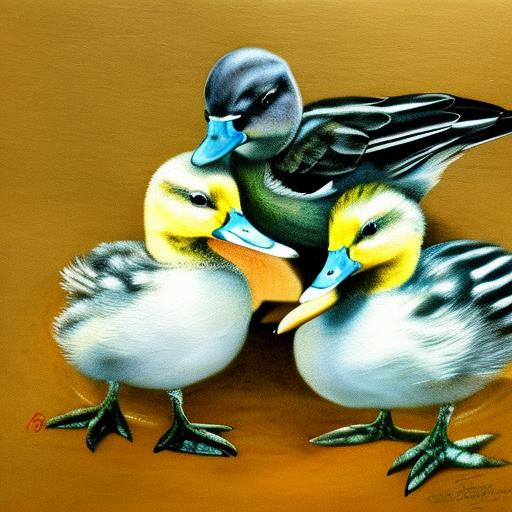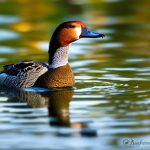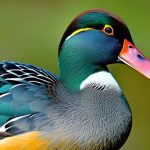Ducklings are adorable and fluffy little creatures that are a joy to raise and care for. They are the young offspring of ducks and are known for their cute appearance and playful nature. Ducklings are often hatched in the spring and are a common sight on farms, in backyard ponds, and even in urban settings. They are social animals that thrive in the company of other ducklings and enjoy swimming, foraging, and exploring their surroundings. Ducklings are also known for their close bond with their mother duck, who provides them with warmth, protection, and guidance in their early days. As they grow, ducklings develop into beautiful adult ducks with vibrant plumage and unique personalities. Raising ducklings can be a rewarding experience, as they bring joy and entertainment to those who care for them.
Key Takeaways
- Ducklings are young ducks that are typically raised for their eggs, meat, or as pets.
- There are many different breeds of ducklings, each with their own unique characteristics and traits.
- Caring for ducklings involves providing them with proper housing, nutrition, and protection from predators.
- Ducklings exhibit social behavior and are known to form strong bonds with their caretakers.
- It is important to monitor the health of ducklings and provide them with regular veterinary care to ensure their well-being.
Different Breeds of Ducklings
There are many different breeds of ducklings, each with its own unique characteristics and traits. Some popular breeds include the Pekin duck, which is known for its large size, white plumage, and friendly disposition. The Mallard duck is another common breed, with its distinctive green head and colorful feathers. Other popular breeds include the Khaki Campbell, Rouen, and Indian Runner ducks, each with its own distinct appearance and personality. Some breeds are raised for their meat or eggs, while others are kept as pets or for ornamental purposes. Each breed has specific care requirements, such as diet, housing, and environmental needs. It’s important to research the different breeds of ducklings to determine which one is best suited for your lifestyle and needs.
Caring for Ducklings
Caring for ducklings requires careful attention to their basic needs, including food, water, shelter, and socialization. Ducklings need a balanced diet that includes commercial duck feed, fresh vegetables, and access to clean water for drinking and swimming. They also require a safe and secure shelter to protect them from predators and the elements. Ducklings are social animals and thrive in the company of other ducklings or adult ducks. It’s important to provide them with plenty of space to roam and explore, as well as opportunities for swimming and foraging. Additionally, ducklings need regular veterinary care to ensure they remain healthy and free from parasites or diseases. By providing proper care and attention, ducklings can grow into happy and healthy adult ducks.
Caring for ducklings is a rewarding experience that requires dedication and commitment. Ducklings need a clean and safe environment to thrive, including access to fresh water for drinking and swimming. They also require a balanced diet that includes commercial duck feed, as well as fresh vegetables and occasional treats. Ducklings should be provided with a warm and dry shelter to protect them from the elements and predators. It’s important to monitor their health and behavior regularly to ensure they are thriving and free from any signs of illness or distress. By providing proper care and attention, ducklings can grow into beautiful adult ducks that bring joy and entertainment to those who care for them.
Duckling Behavior
Ducklings are social animals that thrive in the company of other ducklings or adult ducks. They are known for their playful nature and love of swimming, foraging, and exploring their surroundings. Ducklings are also very curious creatures and enjoy investigating new objects and environments. They are quick learners and can be trained to respond to their names or perform simple tricks. Ducklings are also known for their close bond with their mother duck, who provides them with warmth, protection, and guidance in their early days. As they grow, ducklings develop their own unique personalities and behaviors, making them fascinating animals to observe and interact with.
Ducklings exhibit a range of behaviors that are both entertaining and endearing. They are highly social animals that enjoy the company of other ducklings or adult ducks. Ducklings are also very active creatures that love to swim, forage for food, and explore their surroundings. They are curious by nature and enjoy investigating new objects and environments. Ducklings are also known for their close bond with their mother duck, who provides them with warmth, protection, and guidance in their early days. As they grow, ducklings develop their own unique personalities and behaviors, making them fascinating animals to observe and interact with.
Duckling Health
Duckling health is an important aspect of caring for these adorable creatures. It’s essential to monitor their health regularly and provide them with proper nutrition, clean water, and a safe environment to thrive. Ducklings are susceptible to various health issues, including respiratory infections, parasites, and injuries. It’s important to provide them with regular veterinary care to ensure they remain healthy and free from any signs of illness or distress. Additionally, it’s crucial to provide them with a clean and dry shelter to protect them from the elements and predators. By providing proper care and attention, ducklings can grow into healthy adult ducks that bring joy and entertainment to those who care for them.
Maintaining the health of ducklings is essential for their overall well-being. It’s important to provide them with a balanced diet that includes commercial duck feed, fresh vegetables, and access to clean water for drinking and swimming. Ducklings should also be provided with a warm and dry shelter to protect them from the elements and predators. Regular veterinary care is essential to monitor their health and address any potential issues before they become serious problems. By providing proper care and attention, ducklings can grow into healthy adult ducks that bring joy and entertainment to those who care for them.
Duckling Development

Duckling development is a fascinating process that begins with hatching from an egg and continues as they grow into adult ducks. When ducklings hatch, they are covered in soft down feathers and are unable to regulate their body temperature. They rely on their mother duck for warmth, protection, and guidance in their early days. As they grow, ducklings develop their own unique personalities and behaviors, making them fascinating animals to observe and interact with. They also go through various stages of development, including learning how to swim, forage for food, and establish social hierarchies within their group. With proper care and attention, ducklings can grow into healthy adult ducks that bring joy and entertainment to those who care for them.
Duckling development is an amazing process that begins with hatching from an egg and continues as they grow into adult ducks. When ducklings hatch, they are covered in soft down feathers and rely on their mother duck for warmth, protection, and guidance in their early days. As they grow, ducklings develop their own unique personalities and behaviors, making them fascinating animals to observe and interact with. They also go through various stages of development, including learning how to swim, forage for food, and establish social hierarchies within their group. With proper care and attention, ducklings can grow into healthy adult ducks that bring joy and entertainment to those who care for them.
Duckling Fun Facts
– Ducklings are born with the ability to swim shortly after hatching.
– Ducklings communicate with each other through various vocalizations.
– Ducklings imprint on the first moving object they see after hatching.
– Ducklings have a waterproof coating on their feathers that allows them to stay dry while swimming.
– Ducklings have a keen sense of sight and can see in color.
– Ducklings are highly adaptable animals that can thrive in a variety of environments.
– Ducklings have a unique ability to filter food from water using specialized bill structures.
– Ducklings have a lifespan of 5-10 years depending on the breed and care they receive.
– Ducklings are social animals that thrive in the company of other ducklings or adult ducks.
– Ducklings are intelligent creatures that can be trained to respond to their names or perform simple tricks.
In conclusion, raising ducklings can be a rewarding experience that brings joy and entertainment to those who care for them. By providing proper care and attention, ducklings can grow into healthy adult ducks with vibrant plumage and unique personalities. It’s important to research the different breeds of ducklings to determine which one is best suited for your lifestyle and needs. With dedication and commitment, raising ducklings can be a fulfilling experience that allows you to witness the fascinating process of their development from adorable fluff balls into beautiful adult ducks.
If you’re considering raising ducklings, it’s important to understand the specific care they require as babies. From providing the right food and shelter to ensuring their safety and well-being, there’s a lot to consider. For helpful tips on raising ducklings and ensuring their health and happiness, check out this informative article on poultrywizard.com. This article provides valuable insights into creating a suitable environment for all breeds of ducks as babies, helping you to raise them successfully.
FAQs
What do baby ducks eat?
Baby ducks, also known as ducklings, typically eat a diet of starter crumbles or mash specifically formulated for ducklings. They may also eat small insects, worms, and aquatic plants if they are raised in a natural environment.
How long do baby ducks stay with their mother?
Baby ducks usually stay with their mother for about 6-8 weeks, during which time she will protect and care for them. After this period, they are able to fend for themselves.
How do you care for baby ducks?
Caring for baby ducks involves providing them with a warm and safe environment, proper nutrition, access to clean water for swimming and drinking, and protection from predators. It is also important to handle them gently and provide socialization to ensure they grow up to be well-adjusted ducks.
What are some common breeds of baby ducks?
Common breeds of baby ducks include the Pekin, Mallard, Rouen, Khaki Campbell, and Muscovy. Each breed has its own unique characteristics and traits.
How can you tell the gender of a baby duck?
Determining the gender of a baby duck can be challenging, as it often requires waiting until they are older and their physical characteristics become more distinct. In some breeds, such as the Mallard, the males will develop more colorful plumage than the females, making it easier to differentiate between the two.
Meet Walter, the feathered-friend fanatic of Florida! Nestled in the sunshine state, Walter struts through life with his feathered companions, clucking his way to happiness. With a coop that’s fancier than a five-star hotel, he’s the Don Juan of the chicken world. When he’s not teaching his hens to do the cha-cha, you’ll find him in a heated debate with his prized rooster, Sir Clucks-a-Lot. Walter’s poultry passion is no yolk; he’s the sunny-side-up guy you never knew you needed in your flock of friends!







